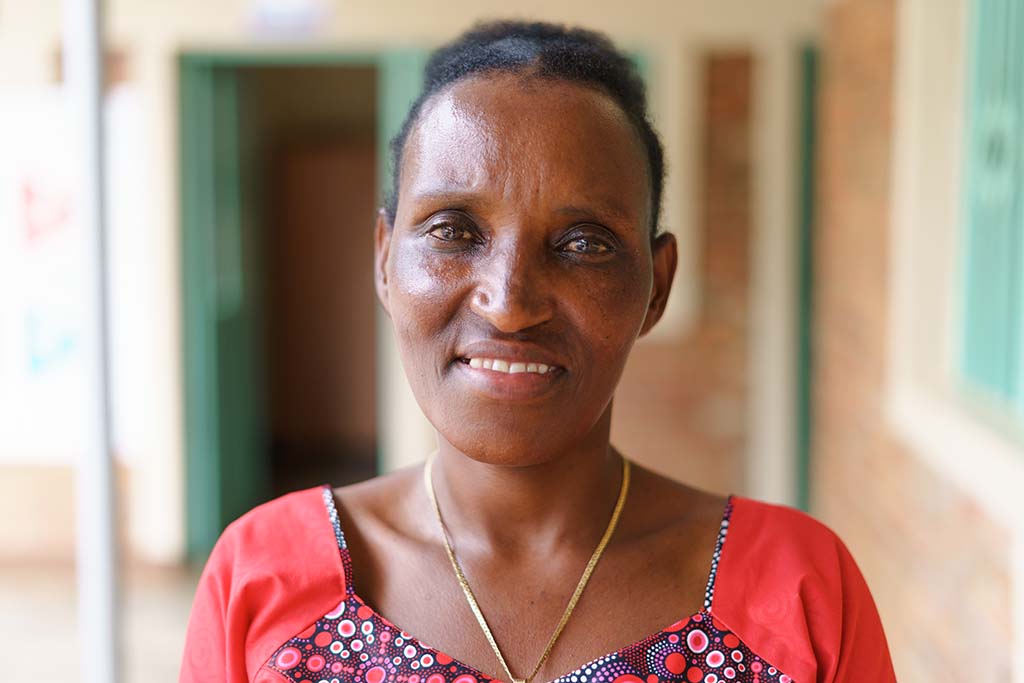Redress after more than a decade
Lawrence had to go to court and demand a paternity test to finally receive the child support she had the right to. Something which wouldn’t have been possible without legal support by the women’s rights organisation Haguruka in Rwanda.

When Lawrence was 30, her marriage was falling apart. Her husband was in the military and wasn’t around very much for the couple’s two children.
“We spent so much time fighting. Finally, we separated,” says Lawrence.
She lives in a village in Ruhango district, south-east of Kigali in Rwanda. To support her two children, Lawrence had to go to the capital to look for work. She was able to secure a position as a domestic worker at a wealthy family in a fancy part of town.
Raped by her employer’s son
But Lawrence problems had just begun. While she was living at her employer’s home, she was raped by the son in the family.
“I said ‘no’,” says Lawrence.
As time went on, the two of them developed a consensual relationship, according to Lawrence. One day, she discovered that she was pregnant. When she told the family, she was kicked out.
Lawrence had nowhere to go but to return home to her village where her children had been staying with her sister. She was now in an even more difficult situation than before.
“I came to Kigali to look for work to be able to support my children and when I came back, I had another problem,” says Lawrence.
No financial support
For many years, Lawrence struggled to get by. The father of her youngest child refused to recognise the boy and thus financially support her. She kept in touch with the man who kept saying that he would ‘get back to her’. But then he moved abroad to study and work in the United States.
Lawrence thought that might be the end of the story. But then she learned that he had in fact returned to Kigali—and not only that, he was now also married.
“When I found out where he lived, I went there with my son, who was 14 at the time. When we came to the house, his wife wouldn’t let us in. But now I knew where he was,” says Lawrence.
Went to a women’s rights organisation
Lawrence had heard about a women’s rights organisation called Haguruka, offering support with legal advice to women who has been subjected to gender-based violence.
In Rwanda, violence against women is widespread, despite laws in place to prevent it. According to a report from USAID, causes for gender-based violence are multifaceted but include unequal power relations between men and women as well as unequal control of resources. Just like in Lawrence’s case.
“I learned about Haguruka from a friend who had gotten support here. Like me, she had a baby with a man who didn’t want to pay child support. She recommended me to seek help,” explains Lawrence.
Haguruka, which is one of The Kvinna till Kvinna Foundation’s partner organisations in Rwanda, took on Lawrence case and supported her with free legal advice. They invited the father to their office, to meet with Lawrence and the legal team, but he didn’t show up.
Taking the case to court
Haguruka then recommended Lawrence to take her case to court, which required a court fee of 10,000 Rwandan francs (approximately 10 US dollars). A lot of money for Lawrence, but she decided it was worth it. Haguruka covered the costs for her legal representation.
Now, the man was forced by law to take a paternity test.
“Taking a paternity test required more money, which I didn’t have, but Haguruka helped me,” says Lawrence.
Finally ensuring child support
The test result was positive. The man was ordered by the court to register the child as his own and pay for his son’s school fees and health insurance. Apart from that, the father now has to pay 50,000 Rwandan francs (approximately 50 US dollar) a month in child support to Lawrence.
“Haguruka’s support has given me my rights, as well as the rights of my son. What they have done for me, is indescribable,” says Lawrence.
Kvinna till Kvinna has supported women’s rights in Rwanda since 2017. One of our partner organisations is Haguruka. Haguruka focuses on ending violence and provide a safe, confidential spaces where citizens will be listened to and given legal support by lawyers and counsellors. From their head office they coordinate a network of over 416 paralegals located across the country. Read more about our work in Rwanda.